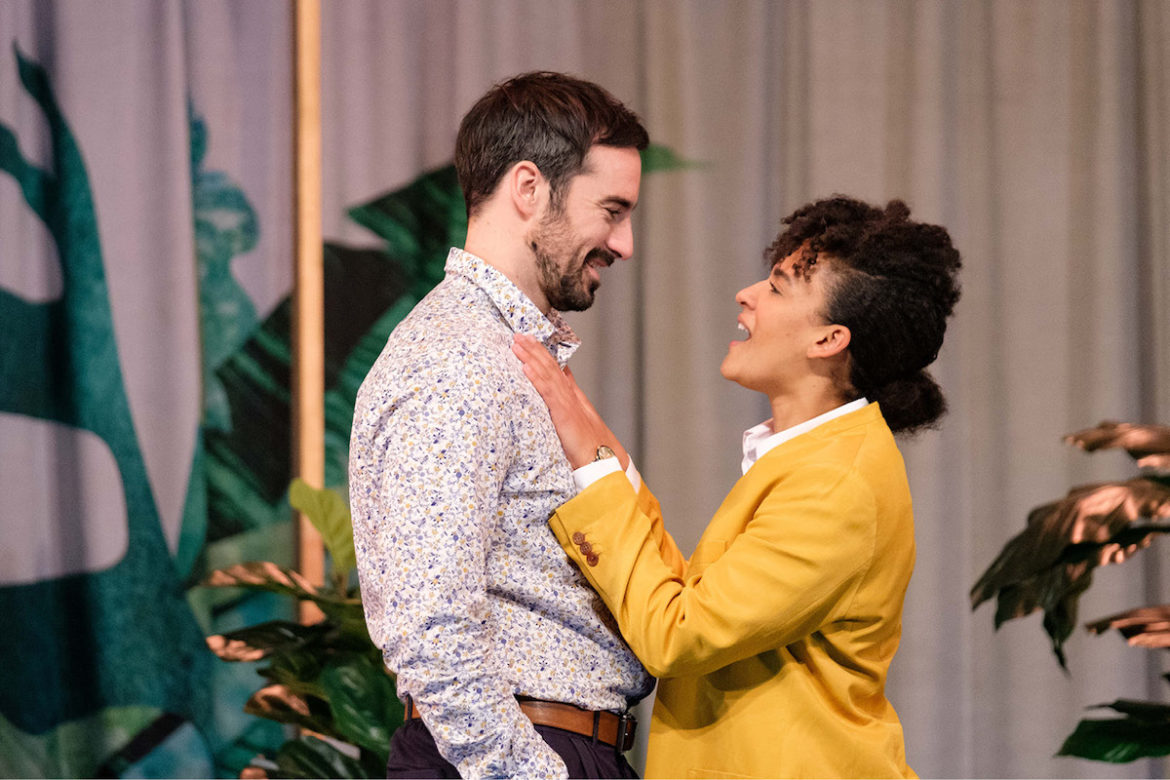‘This production is certainly well-intentioned, but it’s let down by its larger architecture’: Alison Croggon on Bell Shakespeare’s Much Ado About Nothing
The last time I saw Much Ado About Nothing was a Bell Shakespeare production in 2011, directed by John Bell. I dragged along one of my children, employing the arts of deception. Once they were safely captive on the train, I confessed under interrogation that it was a Bell Shakespeare production. Said child, who had been scarred by a previous show from this company, was furious.
In short, things augured badly for our future relations. But fortunately, the 2011 production, which starred Toby Schmitz and Blazey Best as the spiky, wit-cracking lovers Benedick and Beatrice, was laugh-out-loud delightful. Its subtext was lucid, the play of it supple and subtle, and the sparkle of its comedy burnished to a profound sheen.
I’m glad I practised no such deception on Bell Shakespeare’s most recent production, which opened last week at Arts Centre Melbourne before a national tour, because perhaps my son still wouldn’t be speaking to me. Directed this time by James Evans, it took at least half of the play for any sparkle to emerge.
In fact, for the first quarter of an hour I was thoroughly confused. The final scene of the play, in which the veiled daughters of the house are displayed to their suitors, is transposed to the opening as a kind of prologue. Maybe, as this was purportedly a feminist interpretation, this was to highlight the solid patriarchal ideology that structures the plot, in which marriage is an exchange of female commodities between their fathers and their husbands. But because the scene doesn’t belong there, nothing follows from its action.
I wondered if I had misremembered the play: but no, I hadn’t. As it’s written, Shakespeare gets down to business swiftly, with the arrival of Don Pedro in Messina, and the introduction of our romantic heroes Beatrice (Zindzi Okenyo) and Benedick (Duncan Ragg). The superfluous prologue underscores with a heavy hand what is perfectly obvious anyway, while obscuring Shakespeare’s practical dramaturgy.
In fact, the feminist thinking that seems to be at work here is often hamfisted, despite some appealing performances: Zindzi Okenyo, for example, is a marvellous Beatrice, and her liveliness deserves a better frame. Mostly it seems to exist in the gender-flipping of several roles, which – especially in Mandy Bishop’s ribald Dogberry – created some wickedly funny moments, but at other times are, again, simply confusing.
It doesn’t help that its design is so unrelievedly ugly: the set is a bamboo construction vaguely reminiscent of bad 1960s loungerooms, dotted with rubber plants and backed by a white curtain decorated with huge green leaves. Seeing actors too often fighting their way through the curtain to get off stage also didn’t give much sense of its practicality. The costumes seem like a cheap take on The Godfather with some vaguely hiphop elements in the mechanicals of the Watch. At no point does the design resolve into any sense of style, kitsch or otherwise.
This production is certainly well-intentioned, but it’s let down by its larger architecture. The most enjoyable aspect was the musical interludes from Andrée Greenwell, including a setting of Sonnet 116 (“Let me not to the marriage of true minds / Admit impediment”). At this point the stage, which too often seems full of dead blocking, comes to life. I think the problems here mostly come down to indifferent direction that works to obscure, rather than to reveal: once the comedy comes to life, there’s enough vitality in the performances to stave off boredom.
What’s mainly missing is any real sense of the characters’ development: their growth in self-knowledge is reduced to mere plot. The two couples – the feisty Beatrice and Benedick, and the more conventional pair Claudio (Will McDonald) and Hero (Vivienne Awosoga) – must negotiate the deceptions of others in order to reach an understanding of their own true feelings. Instead, it feels as if these characters are haplessly tricked into their coupledom. Maybe this is supposed to be a reflection on the inherent deceptions of heteropatriarchal social structures; but it undermines a crucial sense of agency in the central characters.
There’s a lot of competition in town right now: notably, in the theatre next door at the Arts Centre, the very much better financed fake Shakespeare comedy, Shakespeare in Love. But even a simple production like this one could give the bling a run for its money, if it had some real clarity of thought.
Much Ado About Nothing, by William Shakespeare, directed by James Evans. Design by Pip Runciman, lighting design by Niklas Pajanti, composition and sound design by Andrée Greenwell. Performed by Zindzi Okenyo, Vivienne Awosoga, Danny Ball, Marissa Bennett, Mandy Bishop, Will McDonald, Suzanne Pereira, Duncan Ragg, Paul Reichstein and David Whitney. Bell Shakespeare at Arts Centre Melbourne. Until July 27, then touring nationally until November 24. Bookings


1 comment
I think National Theatre Live _Antony and Cleopatra_ displays something of a similarly dislocated “prologue.” I mean I get making cuts. But transposition like that? I want to yell, don’t f*** with Shakespeare. Though judging from that, including the lead performances, A&C has to be one of the worst plays he wrote. But don’t let me start…
Comments are closed.